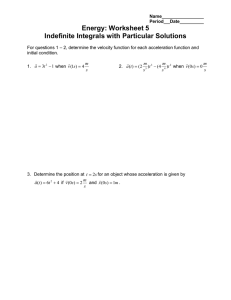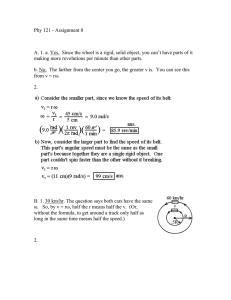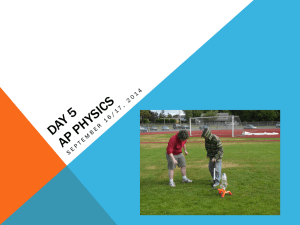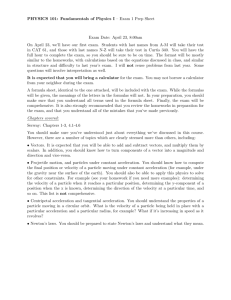3-4 Uniform Circular Motion t v
advertisement
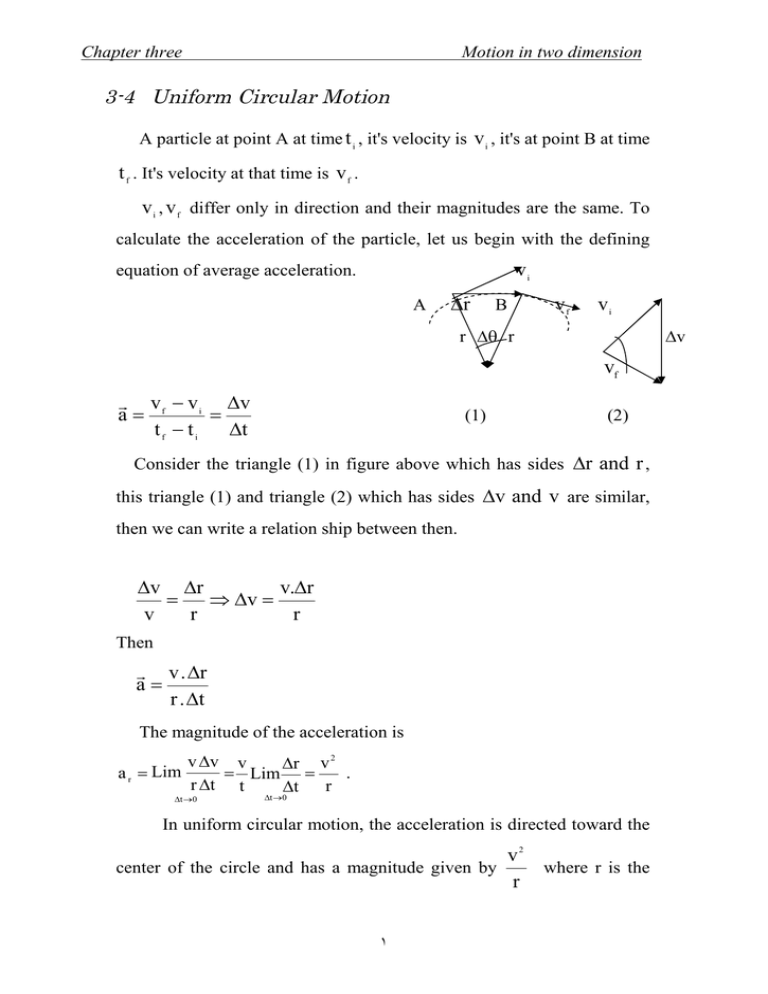
Chapter three Motion in two dimension 3-4 Uniform Circular Motion A particle at point A at time t i , it's velocity is v i , it's at point B at time t f . It's velocity at that time is v f . v i , v f differ only in direction and their magnitudes are the same. To calculate the acceleration of the particle, let us begin with the defining vi equation of average acceleration. A Dr B vf vi r Dq r Dv vf r v - v i Dv a= f = tf - ti Dt (1) (2) Consider the triangle (1) in figure above which has sides Dr and r , this triangle (1) and triangle (2) which has sides Dv and v are similar, then we can write a relation ship between then. Dv Dr v.Dr = Þ Dv = v r r Then r v . Dr a= r . Dt The magnitude of the acceleration is a r = Lim v Dv v Dr v 2 . = Lim = r Dt t Dt r Dt ® 0 Dt ®0 In uniform circular motion, the acceleration is directed toward the v2 center of the circle and has a magnitude given by where r is the r ١ Chapter three Motion in two dimension radius of the circle and v is the speed of the particle . this acceleration is called a "centripetal acceleration " and is along the radial direction. 3-5 Tangential and Radial Acceleration Now. Let us consider a particle moving along a curve path where the velocity change both in direction and in magnitude. The acceleration can be solved into two component vectors; a radial component vector a r and a tangential component vector a t , thus a can be written as: a =ar +at The tangential acceleration a t causes the change in the speed of the particle, it's parallel to the instantaneous velocity. And it's magnitude is r dv a= dt The radial acceleration arises from the change in direction if the velocity vector. v2 ar = r Where r is radius of curvature of the path. a= a 2r + a 2t in uniform circular motion, where v is constant, a t =0 and the acceleration is completely radial. ٢ Chapter three Motion in two dimension Example(1) If the poison of particle (r) moving in xy-plane is given by: r r = (3t 3 - 5t )î + (6 - 7 t 4 )ˆj Calculated the position ,velocity and acceleration at t=2sec? Solution: r r = (3t 3 - 5t )î + (6 - 7 t 4 )ˆj r r = (3(2) 3 - 5(2))î + (6 - 7(2) 4 )ˆj = 4î + 106 ĵ r dr v = = (9 t 2 - 5)î + (-28t 3 )ˆj dt = (9(2) 2 - 5)î + (-28(2) 3 ) ĵ = 31 î - 224 ĵ r dv a= = (18t )î + (-28 * 3t 2 )ˆj dt = (18(2))î + (-28 * 3(2) 2 )ˆj = 36î - 336ˆj ٣
